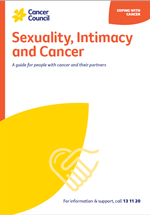- Home
- Cancer Information
- Managing side effects
- Sexuality, intimacy and cancer
- Overcoming specific challenges
- Changes to the vagina
- Coping with changes to the vagina
How to cope with changes to the vagina
Some cancer treatments can change the size of the vagina and make sex uncomfortable or painful. A lack of oestrogen from some cancer treatments can cause vaginal dryness, which may lead to thrush. Treatments such as radiation therapy may cause a loss of sensation in the vagina.
Below are tips for coping with vaginal changes such as:
Short/narrow vagina
- Use personal lubricant to make penetration comfortable. Choose a water-based or silicone-based gel without added perfumes or colouring.
- Ask your nurse or doctor about a non-hormonal vaginal moisturiser and apply several times a week to help keep your vagina lubricated.
- Try a vibrator or regular, gentle sexual intercourse. Experiment with positions for penetration.
- Use a foam ring around the base of your partner’s penis to reduce discomfort and pain during intercourse.
- Talk to your doctor about whether to use a vaginal dilator to widen your vagina after you’ve finished radiation therapy.
Vaginal dryness
- Avoid soap, bubble bath and creams that can irritate your genitals.
- Try a vaginal moisturiser. This non-hormonal, over-the-counter product can help restore lubrication and the natural pH level of the vagina and vulva. It is usually applied 2–3 times per week at night.
- Talk to your doctor about whether oestrogen creams or pessaries (tablets put into the vagina) are an option for you. They may not be right if you are having hormone therapy for cancer. Oestrogen creams are applied in the vagina or onto the vulva, and can help relieve discomfort.
- Personal lubricants are liquids or gels that are applied around the clitoris, labia and vaginal entrance, as well as your partner’s penis during sex. Try applying lubricant as part of your sexual foreplay. Lubricants with a silicone base may last longer than the water-based ones. Avoid oil or petroleum- based products (e.g. baby oil or Vaseline) as they can increase the chance of vaginal infection and damage latex condoms.
- To improve sexual arousal, take more time before and during penetration to help the vagina relax and become well lubricated.
Thrush
- Thrush can occur when genital dryness causes an overgrowth of a yeast-like fungus that is commonly found in the vagina. It can cause itching, burning and an unpleasant discharge, and may make intercourse painful.
- Seek medical advice to rule out other types of vaginal infections.
- Treat thrush with prescription creams or medicines.
- Wear loose, cotton clothes. Avoid nylon pantyhose, tight jeans or pants.
- Don’t use petroleum-based products (e.g. Vaseline) as a lubricant.
- Use a condom to avoid spreading thrush to your partner during sex.
- Ask a dietitian about what to eat to help control thrush. They may suggest eating foods low in sugar and yeast.
Loss of sensation
- Some women experience a loss of sensation in the vagina or labia which may be temporary or permanent, depending on the type of treatment they have had. This can make sex uncomfortable or unsatisfying, or may cause low libido and arousal.
- Focus on other areas of your body and genitals that feel pleasurable when touched.
- Try regular sexual activity of some kind to help maintain your interest in sex.
- Experiment with different sexual positions to try and find one that improves sensation.
- Use a vibrator to enhance sensation in the vagina and surrounding area.
- Seek medical advice – some women may benefit from a vaginal examination to identify and treat medical conditions such as thrush.
- If your usual contraceptive device or medicine is irritating you, try different types of contraception.
Podcast: Sex and Cancer
Listen to more of our podcast for people affected by cancer
More resources
Dr Margaret McGrath, Head of Discipline: Occupational Therapy, Sydney School of Health Sciences, The University of Sydney, NSW; Yvette Adams, Consumer; Dr Kimberley Allison, Out with Cancer study, Western Sydney University, NSW; Andreea Ardeleanu, Mental Health Accredited Social Worker, Cancer Counselling Service, Canberra Health Service, ACT; Kate Barber, 13 11 20 Consultant, Cancer Council Victoria; Dr Kerrie Clover, Senior Clinical Psychologist, Psycho-Oncology Service, Calvary Mater Newcastle, NSW; Maree Grier, Senior Clinical Psychologist, Royal Brisbane and Women’s Hospital, QLD; Mark Jenkin, Consumer; Bronwyn Jennings, Gynaecology Oncology Clinical Nurse Consultant, Mater Health, QLD; Dr Rosalie Power, Out with Cancer study, Western Sydney University, NSW; Dr Margaret Redelman OAM, Medical Practitioner and Clinical Psychosexual Therapist, Sydney, NSW; Kerry Santoro, Prostate Cancer Specialist Nurse Consultant, Southern Adelaide Local Health Network, SA; Simone Sheridan, Sexual Health Nurse Consultant, Sexual Health Services – Austin Health, Royal Talbot Rehabilitation Centre, VIC; Prof Jane Ussher, Chair, Women’s Heath Psychology and Chief Investigator, Out with Cancer study, Western Sydney University, NSW; Paula Watt, Clinical Psychologist, WOMEN Centre, WA.
View the Cancer Council NSW editorial policy.
View all publications or call 13 11 20 for free printed copies.
Need to talk?
Support services
Coping with cancer?
Speak to a health professional or to someone who has been there, or find a support group or forum
Life after cancer treatment
Webinars, exercise and nutrition, sexuality programs, and back-to-work support
Cancer information
Your coping toolbox
Strategies for managing difficult situations during and after cancer treatment
View our publications
Guides and fact sheets for people with cancer, their families and friends

